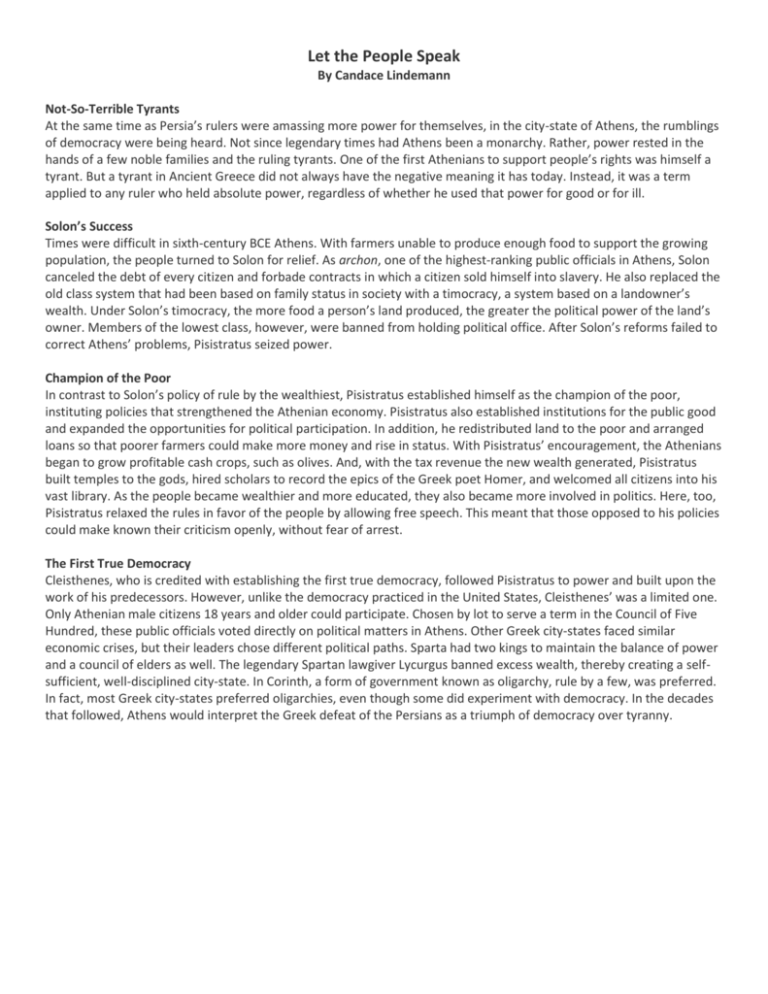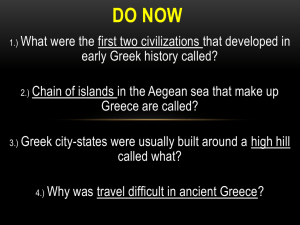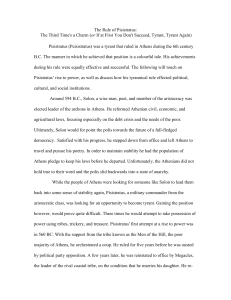Let the People Speak
advertisement

Let the People Speak By Candace Lindemann Not-So-Terrible Tyrants At the same time as Persia’s rulers were amassing more power for themselves, in the city-state of Athens, the rumblings of democracy were being heard. Not since legendary times had Athens been a monarchy. Rather, power rested in the hands of a few noble families and the ruling tyrants. One of the first Athenians to support people’s rights was himself a tyrant. But a tyrant in Ancient Greece did not always have the negative meaning it has today. Instead, it was a term applied to any ruler who held absolute power, regardless of whether he used that power for good or for ill. Solon’s Success Times were difficult in sixth-century BCE Athens. With farmers unable to produce enough food to support the growing population, the people turned to Solon for relief. As archon, one of the highest-ranking public officials in Athens, Solon canceled the debt of every citizen and forbade contracts in which a citizen sold himself into slavery. He also replaced the old class system that had been based on family status in society with a timocracy, a system based on a landowner’s wealth. Under Solon’s timocracy, the more food a person’s land produced, the greater the political power of the land’s owner. Members of the lowest class, however, were banned from holding political office. After Solon’s reforms failed to correct Athens’ problems, Pisistratus seized power. Champion of the Poor In contrast to Solon’s policy of rule by the wealthiest, Pisistratus established himself as the champion of the poor, instituting policies that strengthened the Athenian economy. Pisistratus also established institutions for the public good and expanded the opportunities for political participation. In addition, he redistributed land to the poor and arranged loans so that poorer farmers could make more money and rise in status. With Pisistratus’ encouragement, the Athenians began to grow profitable cash crops, such as olives. And, with the tax revenue the new wealth generated, Pisistratus built temples to the gods, hired scholars to record the epics of the Greek poet Homer, and welcomed all citizens into his vast library. As the people became wealthier and more educated, they also became more involved in politics. Here, too, Pisistratus relaxed the rules in favor of the people by allowing free speech. This meant that those opposed to his policies could make known their criticism openly, without fear of arrest. The First True Democracy Cleisthenes, who is credited with establishing the first true democracy, followed Pisistratus to power and built upon the work of his predecessors. However, unlike the democracy practiced in the United States, Cleisthenes’ was a limited one. Only Athenian male citizens 18 years and older could participate. Chosen by lot to serve a term in the Council of Five Hundred, these public officials voted directly on political matters in Athens. Other Greek city-states faced similar economic crises, but their leaders chose different political paths. Sparta had two kings to maintain the balance of power and a council of elders as well. The legendary Spartan lawgiver Lycurgus banned excess wealth, thereby creating a selfsufficient, well-disciplined city-state. In Corinth, a form of government known as oligarchy, rule by a few, was preferred. In fact, most Greek city-states preferred oligarchies, even though some did experiment with democracy. In the decades that followed, Athens would interpret the Greek defeat of the Persians as a triumph of democracy over tyranny. Judging Right and Wrong in Athens By Charles F. Baker ‘I’ll Sue You!’ Among the ancient Greeks, the Athenians especially loved litigation. There was no police department, but any matter was cause to bring suit against a fellow Athenian. This was true regardless of how petty a matter might be—for example, a guest who took some lamp oil or a neighbor who never returned a borrowed wick. The law profession, as we know it today, did not exist in ancient Athens. Each citizen was expected to plead his own case, but a litigant could hire a speechwriter to draw up his defense or request someone to present it at the trial. Each defendant and each prosecutor, however, had to speak for himself. There were private and public cases. In public ones, any free adult male could bring charges and prosecute. In certain situations, however, Athenian citizenship was necessary. In private matters, the prosecutor had to be the person who claimed to have been wronged. Democracy—But Not for All Athens prided itself on its democratic way of life. But the city-state was a democracy only for its own citizens, and it was these citizens who made and enforced the laws. Foreigners and nonresident Athenians did have some rights. They could initiate a charge against another individual, prosecute, and defend. They were not, however, allowed to vote, hold public office, be a juror, or own property in the province of Attica, where Athens is located. Slaves had no rights at all. Before testifying in court, both citizens and noncitizens took an oath. The testimony of women and minors was allowed only in murder cases, and even then, the closest adult male relative spoke for them. Because Athenians believed that slaves would naturally defend their masters, their testimony was admissible only if obtained through torture. In early times, if a litigant thought that a magistrate’s ruling in a case was unfair, he appealed to a higher court. Since appeals were free, there were many. As the population of Athens grew, so, too, did the number of cases. To relieve the strain on magistrates, anew policy was devised—trial by a jury of peers. This procedure revolutionized the Athenian legal system. Jurors by the Hundreds To qualify as a juror, an individual had to be a male, 30 years of age or older, and a full Athenian citizen. Those who met these criteria could volunteer to serve on the jury. Every year, 6,000 men were chosen by lot from the volunteer pool. Once selected, a juror took an oath to uphold the laws of Athens and to refuse any bribes. He then was assigned to a particular court and heard cases at that court throughout the year. In time, to lessen the burden on poor citizens, jurors were paid, but only for the days they actually sat in court. The juries were quite large. Documents tell of 1,001 jurors, but 401 and 501 appear to have been the most common. The size certainly made bribery difficult. To prevent a juror from knowing which case he was to hear until the day of the trial, every morning, each juror was given a bronze or wooden ticket with his name and a letter of the Greek alphabet inscribed on it. The juror placed this ticket in a box. When a juror’s ticket was drawn, he went to the court that had been given that letter. To further ensure against bribery, courts were assigned these letters by lot the morning of the trial. Athenians had such faith in their jury system that a jury’s decision was final. Appeals were not allowed. 'Let’s Settle!' Anyone wanting to charge a person with a wrongdoing brought his allegation to the proper magistrate, who posted the charge in the agora. The magistrate summoned both parties involved and allowed each to state, defend, or refute the charges made. If a decision was not made at the preliminary hearing, the magistrate set a trial date. Some cases never reached the courts because those involved sought an arbitrator. The two sides then presented their views before the arbitrator and argued their cases. Both sides agreed to accept the arbitrator’s decision. Glossary: Litigation refers to a legal proceeding in a court. In ancient Greece, the agora was the “place of assembly,” especially the “marketplace.”









